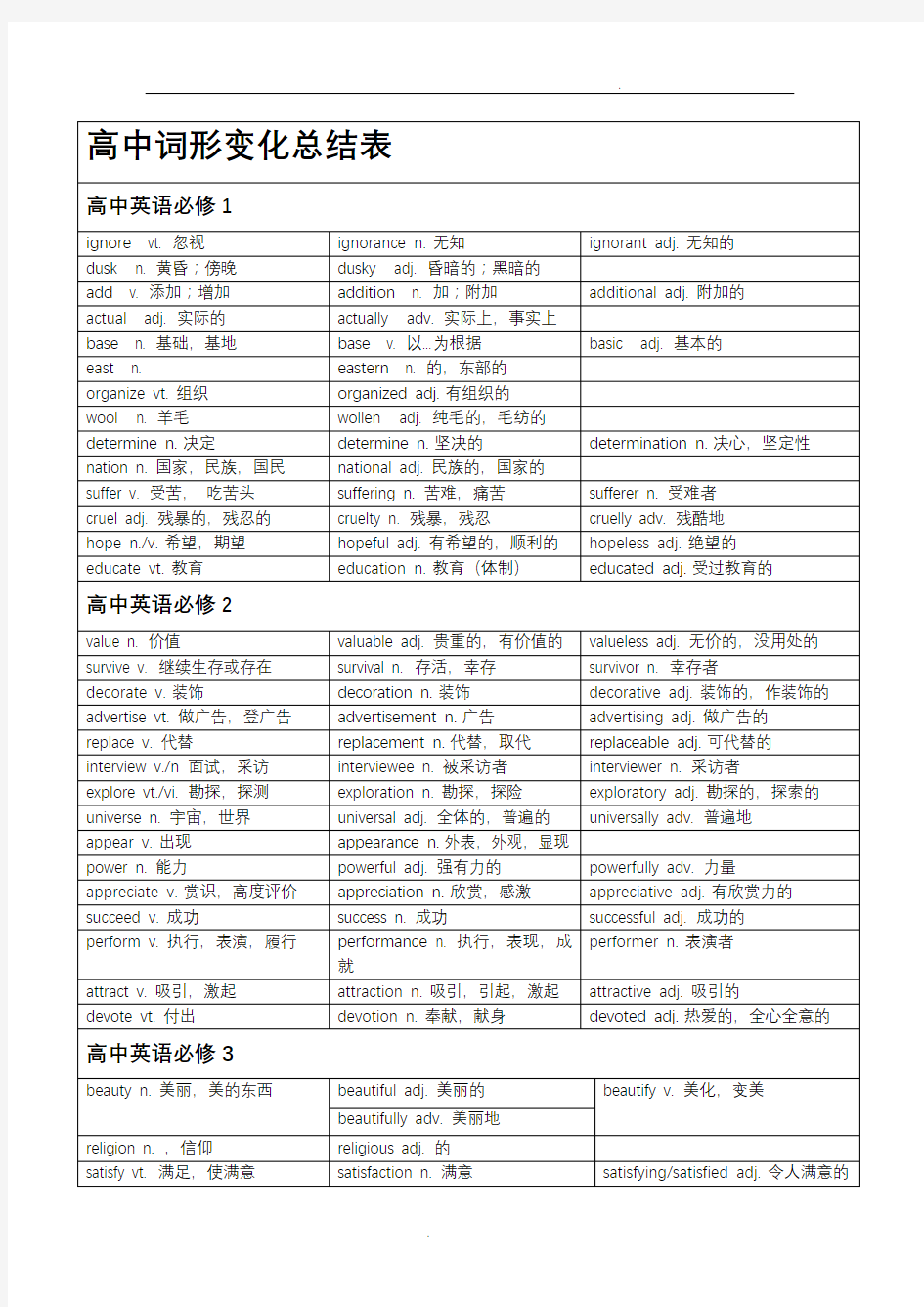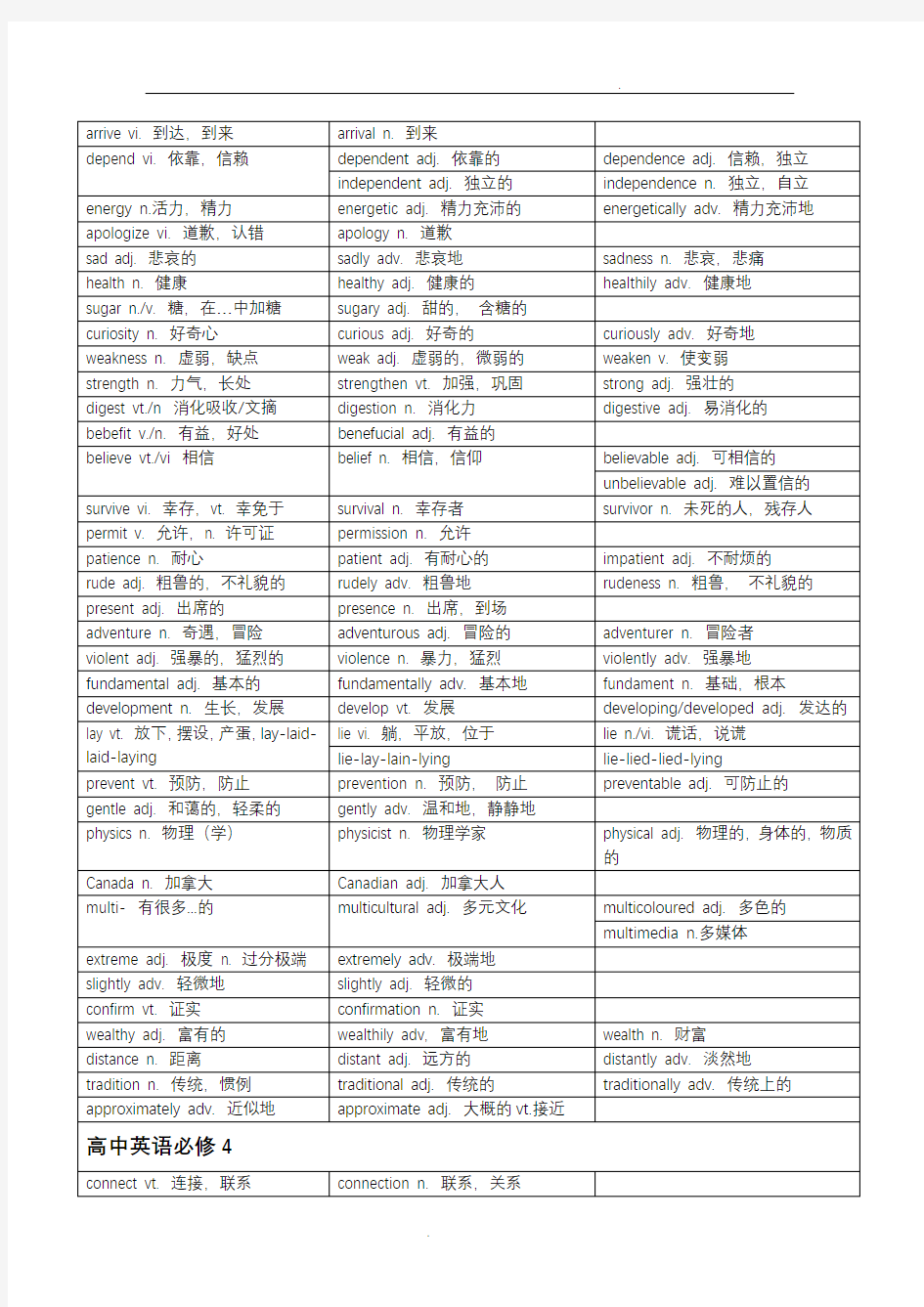高三复习高中词形变化表


高考英语词性转换
A 1. able ability(n.)inability (n.)disability(n.)unable (adj.)disabled(adj.) 2. absent absence(adj.) 3. absolute absolutely(adv.) absoluteness(n.) 4. absorb absorbed(adj.) 5. accept acceptable(adj.) acceptance(n.) 6. access accessible(adj.) 7. accident accidental(adj.) accidentally(adv.) 8. accomplish accomplishment(n.) 9. achieve achievable(adj.) achievement(n.) 10. act action(n.) 11. active activity(n.)activate(v.) 12. actual actually(adv.) 13. advertise advertisement(n.) 1. addict addicted(adj.)addiction(n.) 2. addition additional(adj.) 3. adjust adjustment(n.) 4. admire admirable(adj.)admiration(n.) 5. admit admission(n.) 6.advance advanced(adj.) 7.advantage advantageous(adj.) 8.advise advice(n.) 9.affect(影响) effect(n.)affective(adj) 10.age aged(adj.) 11.agree agreeable(adj.)agreement(n.) 12.agriculture agricultural(adj.) 13. allow allowable(adj.)allowance(n.) 14.amaze amazing / amazed(adj.) amazement(n.) 1.ambition ambitious(adj.) 2.amuse amusing / amused(adj.) amusement(n.) 3.analyze analysis(n.)analytic(adj.) 4.ancient anciently(adv.) 5.angry anger(n.) 6.announce announcement(n.) 7.annoy annoying(adj.) annoyance(n.) 8.annual annually(adv.) 9.anxious anxiety(n.)anxiously(adj.) 10.apologize apologetic(adj.)apology(n.) 11.appear appearance(n.)
英语各类词形变化规则(全)
高中英语各类词形变化规则 基础知识积累(二) 一、动词 1. 动词过去式和过去分词 1). 一般在动词原形后加-ed look --- looked; need--- needed 2). 以-e结尾的动词加-d move --- moved 3). 以辅音字母加y结尾的动词,变y为i,再加-ed carry --- carried; study--- studied;以元音字母加y结尾的词,直接加-ed stay--- stayed; destroy---destroyed 4).以重读闭音节结尾的单词,双写最后的辅音字母,再加-ed. stop--- stopped; regret --- regretted 知识链接:重读闭音节三要素 (1)一个元音字母后跟一个或几个辅音字母,必须是重读音节; (例如prohibit这个词,重读音节在-hi,而不在-bit,就不要双写t. prohibit---prohibited) (2)以一个辅音音素结尾;(例如fix,结尾的辅音音素为两个:/ks/, 就不要双写x, fix---fixed; grow 结尾为双元音/?u/,也不要双写w. (3)元音字母发短元音。[?] [e] [i] [?] [?] 5). 以-r音节(重读)结尾的词,双写r字母,再加-ed. refer ---referred; prefer --- preferred ;如果-r音节不重读,则不用双写:offer---offered 6). 以-l结尾的动词,如果是重读闭音节,双写l, 再加-ed, 例如:control---controlled; 如果不重读,双写不双写l均可,例如travel---travelled/ traveled; quarrel---quarrelled / quarreled 2. 动词-ing变化规则 1). 一般情况下,直接在动词后加-ing work --- working; sleep --- sleeping; study--- studying 2). 动词以不发音的-e结尾,要去-e加-ing take --- taking; make ---making; dance --- dancing 3). 重读闭音节的动词,要双写词尾字母,再加-ing cut--- cutting;put ---- putting; begin ---- beginning 4). 以-ie结尾的动词,把变成y再加-ing lie ---- lying ; tie ---- tying; die ---- dying 5). 以-l结尾的动词,如果是重读闭音节,双写l, 再加-ing, 例如:control---controlling; 如果不重读,双写不双写l均可,例如travel---travelling/ traveling; quarrel---quarrelling / quarreling (注意:辅音之后y变i, 现在分词是例外。) 3. 动词第三人称单数的变化规则: 1) 一般情况下,词尾加s,如;like----likes, want----wants. 2) 以s, x, ch, sh, o结尾的加es,如,watch---watches, go---goes 3) 以y结尾的归两大类:元音字母+y要加s,如play----plays ;辅音字母+y要变y为i+es 如study---studies 二、名词 1. 规则的可数名词的复数变化: 1).一般情况加s :book-- books mouth---mouths house---houses girl---girls 2).以s 、sh 、ch 、x结尾的加es :class--- classes box----boxes match----matches 注意:(1) 以-th结尾的名词直接加-s如:mouth—mouths path—paths ; month—months, ninth—ninths, youth—youths. (2) stomach---stomachs (ch发/k/) 3).辅音字母+ y结尾的变y为i加es:city---cities country----countries party----parties factory----factories 4).以o 结尾的词+es的只有以下词:heroes Negroes;tomatoes;potatoes(黑人英雄喜欢吃土豆和番茄) 以o 结尾并且词尾有两个元音字母+s radios, zoos, bamboos ,studios, 还有pianos ,kilos,photos 还有一些两种变化均可:zeroes/ zeros; mosquitoes/ mosquitos; volcanoes/ volcanos; mottoes/ mottos 5) .以f,fe 结尾的变f或fe为v +es :thief wife life knife wolf half leaf shelf ,self(口诀:妻子拿刀去宰狼,小偷吓得心发慌,躲在架后保己命,半片树叶遮目光)注意:直接加-s的有:belief---beliefs, chief---chiefs, grief---griefs(悲伤的事), cliff---cliffs, roof---roofs, safe---safes 两种变化都可以的有:handkerchief---handkerchiefs/ handkerchieves; scarf; hoof; dwarf 2. 不规则的变化 1).man—men, woman—women, tooth—teeth, foot—feet, goose—geese , child—children, mouse—mice, phenomenon---phenomena, crisis---crises; criterion---criteria 2).单复数相同: sheep, deer, fish, Chinese, Japanese , Swiss, craft, means, series, species 3).以man, woman 修饰名词构成合成词时,两个词都变化. a man servant—three men servants 但boy与girl不要变化a girl student---three girl students 4) 合成词的单数变复数,一般在词尾加-s/-es,如有名词作为中心词,则加在该名词后。如:grown-up---grown-ups; passer-by---passers-by; mother-in-law---mothers-in-law 三、形容词和副词 1. 形容词和副词的比较级和最高级变化规则 1) .一般单音节词和少数以-er,-ow结尾的双音节词,比较级在后面加-er,最高级在后面加-est; (1)单音节词如:small→smaller→smallest ;short→shorter→shortest ;tall→ taller→ tallest ; great→greater→ greatest (2)双音节词如:clever→cleverer→ cleverest ; narrow→narrower→ narrowest 2).以不发音e结尾的单音节词,比较在原级后加-r,最高级在原级后加-st;如:large→larger→largest; nice→nicer→ nicest; able →abler→ ablest 3) .在重读闭音节(即:辅音+元音+辅音)中,先双写末尾的辅音字母,比较级加-er,最高级加-est; 如:big→ bigger → biggest; hot→hotter→ hottest; fat→fatter→ fattest 4).以“辅音字母+y”结尾的双音节词,把y改为i,比较级加-er,最高级加-est;如:easy→easier→easiest; heavy→heavier→heaviest; busy→busier→busiest; happy→happier→happiest
高中英语常用词形变化规则精编
高中英语常用词形变化规则精编 一、动词 1. 动词过去式和过去分词 1). 一般在动词原形后加-ed look --- looked; need--- needed 2). 以-e结尾的动词加-d move --- moved 3). 以辅音字母加y结尾的动词,变y为i,再加-ed carry --- carried; study--- studied;以元音字母加y结尾的词,直接加-ed stay--- stayed; destroy---destroyed 4).以重读闭音节结尾的单词,双写最后的辅音字母,再加-ed. stop--- stopped; regret --- regretted 知识链接:重读闭音节三要素 (1)一个元音字母后跟一个或几个辅音字母,必须是重读音节; (例如prohibit这个词,重读音节在-hi,而不在-bit,就不要双写t. prohibit---prohibited) (2)以一个辅音音素结尾;(例如fix,结尾的辅音音素为两个:/ks/,就不要双写x, fix---fixed; snow结尾为双元音/??/,也不要双写w. (3)元音字母发短元音。[?] [e] [i] [?] [?] 5). 以-r音节(重读)结尾的词,双写r字母,再加-ed. refer ---referred; prefer --- preferred ; 如果-r音节不重读,则不用双写:offer---offered 6). 以-l结尾的动词,如果是重读闭音节,双写l, 再加-ed, 例如:control---controlled; 如果不重读,双写不双写l均可,例如travel---travelled/ traveled; quarrel---quarrelled / quarreled 2. 动词-ing变化规则 1). 一般情况下,直接在动词后加-ing work --- working; sleep --- sleeping; study--- studying 2). 动词以不发音的-e结尾,要去-e加-ing take --- taking; make ---making; dance --- dancing 3). 重读闭音节的动词,要双写词尾字母,再加-ing cut--- cutting;put ---- putting; begin ---- beginning 4). 以-ie结尾的动词,把变成y再加-ing lie ---- lying ; tie ---- tying; die ---- dying 5). 以-l结尾的动词,如果是重读闭音节,双写l, 再加-ing, 例如:control---controlling; 如果不重读,双写不双写l均可,例如travel---travelling/ traveling; quarrel---quarrelling / quarreling (注意:辅音之后y变i, 现在分词是例外。) 3. 动词第三人称单数的变化规则: 1) 一般情况下,词尾加s,如;like----likes, want----wants. 2) 以s, x, ch, sh, o结尾的加es,如,watch---watches, go---goes 3) 以y结尾的归两大类:元音字母+y要加s,如play----plays ;辅音字母+y要变y为i+es如study---studies 二、名词 1. 规则的可数名词的复数变化: 1).一般情况加s :book-- books mouth---mouths house---houses girl---girls 2).以s 、sh 、ch 、x结尾的加es :class--- classes box----boxes match----matches 注意: (1) 以-th结尾的名词直接加-s如:mouth—mouths path—paths ; month—months, ninth—ninths, youth—youths. (2) stomach---stomachs (ch发/k/) 1
常 考 词 形 变 化 归 纳 7 -or-al
常考词形变化归纳7 –or-al 以or结尾的名词 actor doctor inventor investor collector creator conductor director editor educator monitor visitor competitor sailor survivor professor author governor ancestor emperor ambassador bachelor sponsor navigator commentator mediator -al / -ial 1. origin n. 起源→original adj. 原来的;最初的→originate v. 起源 2. tradition n. 传统→traditional adj. 传统的;习俗的 3. option n. 选择→optional adj. 可选择的 4. continent n. 大陆,大洲→continental adj. 大陆的,大洲的 5. environment n. 环境→environmental adj. 环境的 6. coast n. 海岸→coastal adj. 沿海的 7. convention n. 惯例,常规;习俗→conventional adj. 按惯例的;传统的 8. universe n. 宇宙→universal adj. 宇宙的,全世界的;普世的 9. globe n. 地球;地球仪→global adj. 全球的 10. culture n. 文化→cultural adj. 文化的 11. nature n. 自然;天性,性格→natural adj. 自然的→naturally adv. 自然地 12. agriculture n. 农业→agricultural adj.农业的 13. centre / center n. 中心→central adj.中央的,中心的;重要的,核心的 14. economy n. 经济→economical adj. 经济的;节约的→economist n. 经济学家 15. politics n. 政治→political adj. 政治的→politician n. 政治家 16. history n. 历史→historical adj. 历史性的→historic adj. 有历史意义的 17. geography n. 地理→geographical adj. 地理的 18. intellect n. 智力;思维→intellectual adj. 脑力的;思维的;需用才智的 19. finance n. 财政,金融→financial adj. 财政的,金融的 20. face n. 脸→facial adj. 脸部的,面部的 21. race n. 种族→racial adj. 种族的 22. society n. 社会;社团;交往→social adj. 社会的 23. influence vt. & n. 影响→influential adj. 有影响的 24. benefit n. 好处,利益→beneficial adj. 有益的,有用的 25. industry n. 工业→industrial adj. 工业的
词性转换规律
一.形容词变副词规律小结
二.名词复数的变化规律 1、规则变化 1) 一般情况直接在词尾加-s . 如:chair—chairs;apple—apples;grape—grapes; 2)以s、sh、ch、x等结尾的词加–es .如:bus—buses;watch—watches;box—boxes;brush —brushes 3)以辅音字母+y结尾的词,变y 为i 再加es,baby—babies;city—cities;family—families 4)以f或fe结尾的将f或fe直接换成ves. 如:knife—knives;thief—thieves;shelf—shelves 2、不规则变化 1)没有规律的变化。如:child—children;foot—feet;tooth—teeth;mouse—mice; woman—women等。 2)单复同形。如:deer—deer;sheep—sheep;fish—fish;yuan—yuan;tofu—tofu; pork—pork等。 3)以o结尾的名词有的加es有的加s. 如:potato—potatoes;tomato—tomatoes;Hero—heroes 二、动词第三人称单数的变化规则 1)直接在动词后+s. 如:like—likes;play—plays;read—reads;get—gets;help—helps; ski—skis等。 2)以s, x, sh, ch, 接尾的动词:+es. 如:wash—washes;wacth—watches;teach—teaches; brush—brushes等。 3)以辅音+o接尾的动词:+es. 如:go—goes;do—does等。 4)以辅音+y接尾的动词:变y为i+es. 如:fly—flies;study —studies;carry—carries; sky—skies等。 末尾字母y前为元音字母的,直接在动词后面加-s. 如:play—plays;say—says 5)特殊变化。如:be—is;have—has等。这些没有规律,需要加强记忆。 三、动词现在分词-ing形式的构成 1)一般情况在动词原形后加-ing . 如:go—going;stand—standing;climb—climbing等。2)以不发音的e结尾的动词,去掉e,再加-ing. 如:write—writing;hope—hoping;care—caring 3)以-ie结尾的动词应先将e去掉,将i变成y然后再加-ing. 如:die—dying,tie—tying等。4)如果动词最后一音节为重读闭音节,最后一个字母需要重复. 如:run—running; stop—stopping;hop—hopping;plan—planning;star—starring;但辅音x是个例外,无需重复(x其实起着两个辅音的作用)。如:tax—taxing,relax—relaxing等。 5)以-ee,-oe,-ye结尾的动词加-ing时应保留词尾e. 如:see—seeing;hoe—hoeing;eye—eyeing 6)-ic结尾的动词应先在字母c后加一字母k再加-ing. 如:panic—panicking; picnic—picnicking 三.动词变名词小结 1.在词尾加er,r ,双写加er 或or: A. play _ player, sing _ singer, wait _ waiter , find _ finder, thrill _ thriller
高三复习高中词形变化表
高中词形变化总结表 高中英语必修1 ignore vt. 忽视ignorance n. 无知ignorant adj. 无知的 dusk n. 黄昏;傍晚dusky adj. 昏暗的;黑暗的 add v. 添加;增加addition n. 加;附加additional adj. 附加的 actual adj. 实际的actually adv. 实际上,事实上 base n. 基础,基地base v. 以...为根据basic adj. 基本的 east n. 东方eastern n. 东方的,东部的 organize vt. 组织organized adj. 有组织的 wool n. 羊毛wollen adj. 纯毛的,毛纺的 determine n. 决定determine n. 坚决的determination n. 决心,坚定性nation n. 国家,民族,国民national adj. 民族的,国家的 suffer v. 受苦,吃苦头suffering n. 苦难,痛苦sufferer n. 受难者 cruel adj. 残暴的,残忍的cruelty n. 残暴,残忍cruelly adv. 残酷地 hope n./v. 希望,期望hopeful adj. 有希望的,顺利的hopeless adj. 绝望的 educate vt. 教育education n. 教育(体制)educated adj. 受过教育的 高中英语必修2 value n. 价值valuable adj. 贵重的,有价值的valueless adj. 无价的,没用处的survive v. 继续生存或存在survival n. 存活,幸存survivor n. 幸存者 decorate v. 装饰decoration n. 装饰decorative adj. 装饰的,作装饰的advertise vt. 做广告,登广告advertisement n. 广告advertising adj. 做广告的 replace v. 代替replacement n. 代替,取代replaceable adj. 可代替的interview v./n 面试,采访interviewee n. 被采访者interviewer n. 采访者 explore vt./vi. 勘探,探测exploration n. 勘探,探险exploratory adj. 勘探的,探索的universe n. 宇宙,世界universal adj. 全体的,普遍的universally adv. 普遍地 appear v. 出现appearance n. 外表,外观,显现 power n. 能力powerful adj. 强有力的powerfully adv. 力量大地appreciate v. 赏识,高度评价appreciation n. 欣赏,感激appreciative adj. 有欣赏力的succeed v. 成功success n. 成功successful adj. 成功的 perform v. 执行,表演,履行performance n. 执行,表现,成就performer n. 表演者 attract v. 吸引,激起attraction n. 吸引,引起,激起attractive adj. 吸引的 devote vt. 付出devotion n. 奉献,献身devoted adj. 热爱的,全心全意的高中英语必修3 beauty n. 美丽,美的东西beautiful adj. 美丽的beautify v. 美化,变美 beautifully adv. 美丽地 religion n. 宗教,信仰religious adj. 宗教的 satisfy vt. 满足,使满意satisfaction n. 满意satisfying/satisfied adj. 令人满意的arrive vi. 到达,到来arrival n. 到来
常 考 词 形 变 化 归 纳 4 -ence -ance
常考词形变化归纳4 -ence / -ance 1. intelligent adj. 聪明的→intelligence n. 智力 2. patient adj. 耐心的n. 病人→patience n. 耐心 3. silent adj. 安静的;沉默的,不说话的→silence n. 安静;沉默,不说话 4. different adj. 不同的→difference n. 差异,区别 5. independent adj. 独立的→independence n. 独立 6. violent adj. 猛烈的,激烈的,强烈的→violence n. 暴力→violently adv. 猛烈地,激烈地 7. convenient adj. 方便的→convenience n. 方便;便利→inconvenience n. 不便;麻烦 8. confident adj. 自信的→confidence n. 信心→confidently adv. 自信地 9. absent adj. 缺席的,不在场的;缺乏的→absence n. 缺乏,不存在 10. present adj. 出席的,在场的→presence n. 出席,在场 11. distant adj. 遥远的→distance n. 距离 12. important adj. 重要的→importance n. 重要性 13. significant adj. 重要的→siginificance n. 重要性 ● 1. perform v. 表演;运行;表现→performance n. 表演;→performer n. 表演者 2. assist vt. 帮助,援助→assistance n. 帮助,援助→assistant n. 助手,助理 3. resist vt. 抵抗,忍耐;抵制→resistance n. 抵抗→resistant adj. 有抵抗力的 4. appear v. 出现,露面→appearance n. 外貌,外观;出现,露面 5. insure v. 给……投保→insurance n. 保险 6. guide v. 指导,引导→guidance n. 指导,引导 7. ignore v. 忽视;不理,不管→ignorance n. 无知,愚昧→ignorant adj. 愚昧的,无知的 8. enter v. 进入→entrance n. 入口 9. exist vi. 存在→existence n. 存在→existing adj. 存在的;目前的 10. refer vt. 谈到;提到;查阅→reference n. 参考,查阅 11. prefer vt. 更喜欢→preference n. 偏爱;偏爱的事物 12. defend vt. 保护,防卫→defe nce n. 保护,防卫 13. offend vt. 触怒,得罪,冒犯→offence n. 冒犯,触怒;
高中英语词形变化
高中英语词形变化 ValueadjSurvivenAmazenadjDecoratenReceivenEvidenceadjExplodenTh eentranceSinkptppCompetenRegularnBasisvbebasedAdmitnbeadmittedR esponsiblenAdvertisenFooladjPainadjUniversalnvaluablesurvivalamazem entAmazingamazeddecorationreceptionevidentexplosiontosanksunkcomp etitorcompetitionregulationbaseonadmissiontointoresponsibilityadvertise mentfoolishpainfuluniverseOperatenIntelligenceAdjRealnApplynFinance adjHappynTypeadjAriseptppAppearprotectnLosenRespondnDistanceadjR elievenMercyadjAffectnHarmadjBiteptppBookoperationintelligentreality applicationfinancialhappinesshappinessarosearisenappearanceprotectionlo ssresponsedistantreliefmercifuleffectharmfulbitbittenMusic音乐家PerformncashHumorAdjAttractnadjExcitenDipptbriefDevoteadjnBesensit iveBookmusicianperformanceinhumorousattractionattractiveexcitementdi ppedindevoteddevotionto词形变化(听写)beautifulnstarvenoriginadjBelievenbelievesthArrivenDependadjAgric ultureAdjAdmireadjnEnergyadjPermitnApologizenSadnForgiveptppbeaut ystarvationoriginalbeliefinarrivalindependentagriculturaladmirableadmira tionenergeticpermissionapologysadnessforgaveforgivenUnit词形变化(听写)adietBalanceadjWeighnSlim比较级CuriousnLieptppWinnWeaknStrongndebtLimitnadjBenefitadjCombinenU nitonbalancedweightslimmercuriosityliedliedwinnerweaknessstrengthinli
中考英语 专题01 词形变化归纳(记忆版)
词形变化 1.swim v. → swimming (n.) 游泳 2.dance v. →dancing (n.) 跳舞;舞蹈 3.hobby n. →hobbies (复数) 4.slim adj. → slimmer(比较级) 5.fly v. → flies(第三人称单数) 27.taste v. →tasty (adv.) 28.woman n. → women (复数) https://www.360docs.net/doc/1c17629358.html,fort n. →comfortable(adj.) → comfortably (adv.) 30.expensive adj. → cheap/inexpensive(反义词) 25.child n. →children (复数) 26.energy n. →energetic (adj.) 52.policeman n. →policemen (复数) 53.postman n. →postmen (复数) 6. interest v. → interesting (adj.) 有趣的31. lend v. → borrow (反义词) 7. good adj. → well (adv.) → better (比较级)32. health n. → healthy (adj.) healthily (adv.) → best (最高级) 33. include v. →including(prep.) 8. play v. → player (n.) 运动员34. help v. → helpful (adj.) 有用的 9. hero n. →heroes(复数) 35. visit v. →visitor (n.) 参观者 10. true adj. → truly (adv.)36. luck n. → lucky (adj.) 11. modern adj. → ancient (反义词)37. art n. → artist (n.) 艺术家 12. diary n. →diaries (复数) 38. France n. →French (n.) 法语 13. take v. →taken (过去分词) 39. Japanese n. → Japanese (复数) 14. build v. → building (n.) 建筑物40. video n. → videos (复数) 15. get v. → getting (现在分词) 41. knife n. →knives (复数) 16. wake v. →woken (过去分词) 42. invite v. → invitation (名词) 17. luck n. →lucky(adj.) → luckily 43. break v. → broken (adj.) (adv.) → unluckily(adv.反义词) 44. sick adj. → sickness(n.) 18. activity n. → activities(复数) 45. foot n. → feet (复数) 19. bright adj. →brighter (比较级) 46. Country n. →countries (复数) 20. two num. →twice(adv.) 两47. knife n.→knives(复数) 21. inside prep. → outside (反义词) 48. own adj.→owner(名词) 22. tooth n. → teeth (复数) 49. visit v. →visitor (名词) 23. sheep n. → sheep (复数) 50. help v. →helpful (形容词) 24. potato n. → potatoes (复数) 51. broken adj.→break (动词)
高考英语词性转换总汇答案
高考英语词性转换总汇 1.ability n. 能力;才能able a. 能够;有能力的unable a. 不能的,不能胜任的enable v. 使(人)能够 2.absence n. 不在,缺席absent a. 缺席,不在 3.achieve vt. 达到,取得achievement n 达成;完成[U], 成就,成绩[C] 4.act n. 法令,条例v. (戏)表演,扮演(角色),演出(戏);行动,做事action n. 行动active a. 积极的,主动的activity n. 活动 actor n. 男演员actress n. 女演员 " 5.advertise vt. 为……做广告advertisement n. 广告 6.amaze v.惊奇,惊叹;震惊amazement n 惊奇,诧异[U] 7.amuse vt. (使人)快乐,逗乐amusement n. 娱乐 8.anger n. 怒,愤怒angry a. 生气的,愤怒的angrily adv 愤怒地,生气地9.announce vt. 宣布,宣告announcement n. 通告,通知 10.anxious a. 忧虑的,焦急的anxiety[??'zai?ti] n. 1. 焦虑,挂念[U][C][(+about/for)] 2. 焦虑的原因;令人焦虑之事[C][(+to)] 3.渴望[C][(+for)][+to-v] 11.asleep a. 睡着的,熟睡sleep vi. 1. 睡,睡觉2.长眠,安息3. 静止下来,保持寂静5. 发生性关系,与...上床[(+with)] ;vt. 1. 睡(觉)2. 用睡眠消除,以睡眠度过[(+off/away)] n.睡眠[U] 12.athlete n. 运动员athletic adj 运动的,体育的;athletics n. [?θ'letiks]体育运动,竞技[G] ,体育(课)[J] > 13.attention n. 注意,关心attentively ad. 注意地 14.attract v. 吸引,引起attractive a. 迷人的,有吸引力的;attraction n.吸引;吸引力[U] . 吸引物;喜闻乐见的事物[C] 15.advice n. 忠告,劝告,建议advise vt. 忠告,劝告,建议adviser n. [C]顾问;劝告者[(+on sth./to sb.)] 16.agree vi. 1. 意见一致[(+with/about/on)]2. 同意,赞同[(+to n)] . 3.相符[(+with)] 4.相宜,适合[(+with)] 5.和睦相处;vt. 1. 同意[+to-v] 2.承认[+(that)] 3.对...达成协议;接受 agreement n. 同意,一致;协定,协议 17.agricultural a. 农业的agriculture n. 农业,农学 18.apologize vi. 道歉,谢罪apology n. 道歉;歉意 ! 19.appear vi. 出现appearance n. 出现,露面;容貌 20.application n. 申请apply v. 申请applicant n. n. 申请人[C][(+for)] 21.appreciate vt. 1. 欣赏,赏识2.感谢,感激3,体会,领会,察知;appreciation n. 1. 欣赏,鉴赏; 赏识[U] [(+of)]; 2.正确评价,鉴识[U][(+of)] 3感谢[U][S1][(+for)] 4. 涨价;增值[U] 22.argue vi. 争辩,争论argument n. 争论,辩论 23.arrange v. 安排,布置arrangement n. 安排,布置 24.arrival n. 到来,到达arrive vi. 到达;达到 25. age n.年龄;时代;老年;年龄段vt.& vi.(使)长大;使显老;使变老;使苍老 aged adj.老年的,陈年的 " 26. avail n.效用,利益vt.& vi. 有益于,有益于;使对某人有利 available adj. 可用的;有空的;可会见的;(戏票、车票等)有效的 27. analyze/ analyse vt.<美>分析;分解;解释;对…进行心理分析analysis n.分析,分解; 梗概,要略;[数]解析;验定复数:analyses; analyzable adj. 可被分析的,可以分解的 28. affect vt.影响;假装;感动;(疾病)侵袭n.感情,情感,心情;[精神病学]情绪反应
高考词汇词性变化规律:动词类变化
高考词汇词性变化规律:动词类变化 词性变化之动词类1. 动词+后缀-y 变为名词deliver → delivery 运送discover → discovery 发现recover → recovery 康复;恢复 2. 动词+后缀-ing 变为名词 begin → beginning 开始;开端 build → building 建筑(物) cross → crossing 十字路口end → ending 结局;结尾engine → engineering 工程feel → feeling 感觉 hear → hearing 听力market → marketing 促销meet → meeting 会议paint → painting 绘画;油画spend → spending 花销suffer → suffering 苦难 train → training 训练;培养 3.动词+后缀-ment 变为名词
acquire → acquirement n. 取得accomplish → accomplishment 成就achieve → achievement 成就adjust → adjustment 调整;调节amuse → amusement 愉快;快乐;消遣announce → announcement 宣告;述说appoint → appointment 约会;预约;任命 argue → argument 争论arrange → arrangement 安排 assess → assessment 评估assign → assignment 分配;任务 astonish → astonishment 惊讶 develop → development 发展disappoint → disappointment 失望embarrass → embarrassment 尴尬 employ → employment 雇用enjoy → enjoyment 享受;欢乐entertain → entertainment 款待;娱乐equip → equipment 设备 establish → establishment 建立
